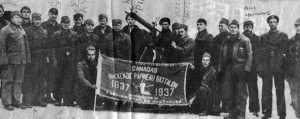Why are the Mac-Paps all but forgotten?
A recent article by Canada’s Time Colonist journalist Cory Ruf explores the history of the Mackenzie-Papineau Battalion, its survivors, and how it has (not) been remembered. Canadians first arrived in Spain in 1936, but it was not until the bloody Brunete offensive in July 1937 that the Canadians received their own unit, composed of both Canadians and Americans. They fought hard, yet were later sent home with the rest of the International Brigades, many to suffer poverty and abandonment as the Canadian government did not officially recognize the unit. Only in 2000 did a statue and plaque go up in Vancouver.
[Yet the] federal departments of National Defence and Canadian Heritage say they have not held, nor do they plan to hold, any ceremonies to commemorate the event. And save for Jules Paivio, a 95-year-old Finnish-Canadian who resides in Ontario, no Mac-Paps are left to raise a fuss.
The Mac-Paps’ position as a footnote in Canada’s military history is nothing new. The names of volunteers who died in Spain do not appear in Veterans Affairs Canada’s Books of Remembrance. Survivors did not collect government pensions for their efforts. And permanent exhibitions at the Canada War Museum in Ottawa make no explicit reference to the group.
Ruf argues that this is predominantly a result of the Mac Paps’ ties to Communism.
To read more, click here.













